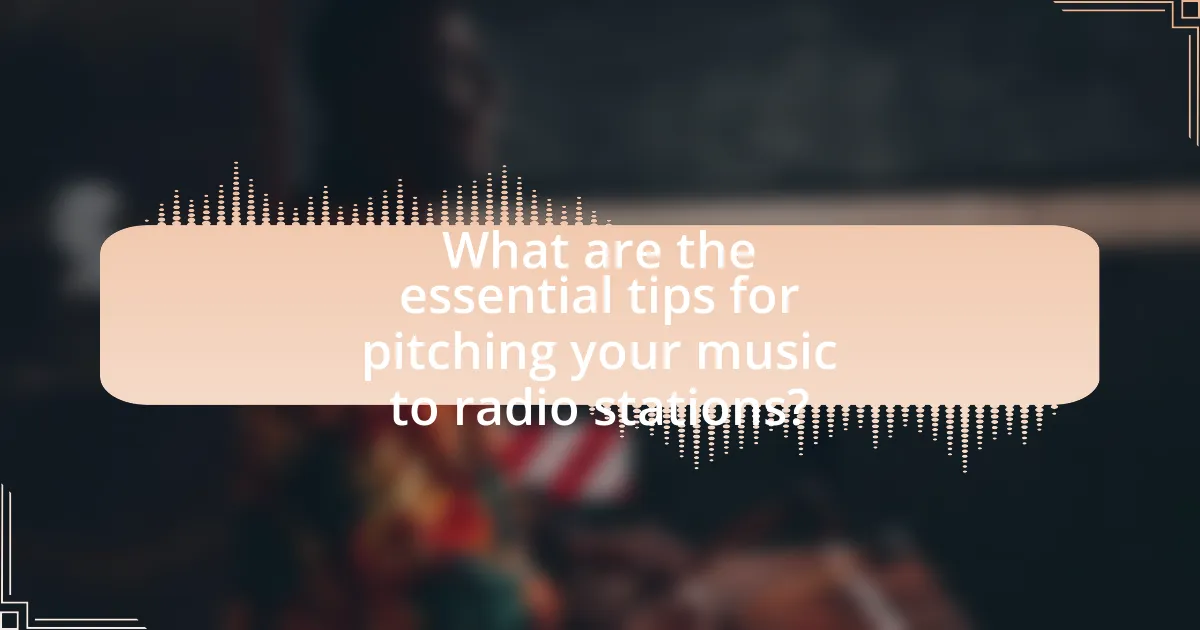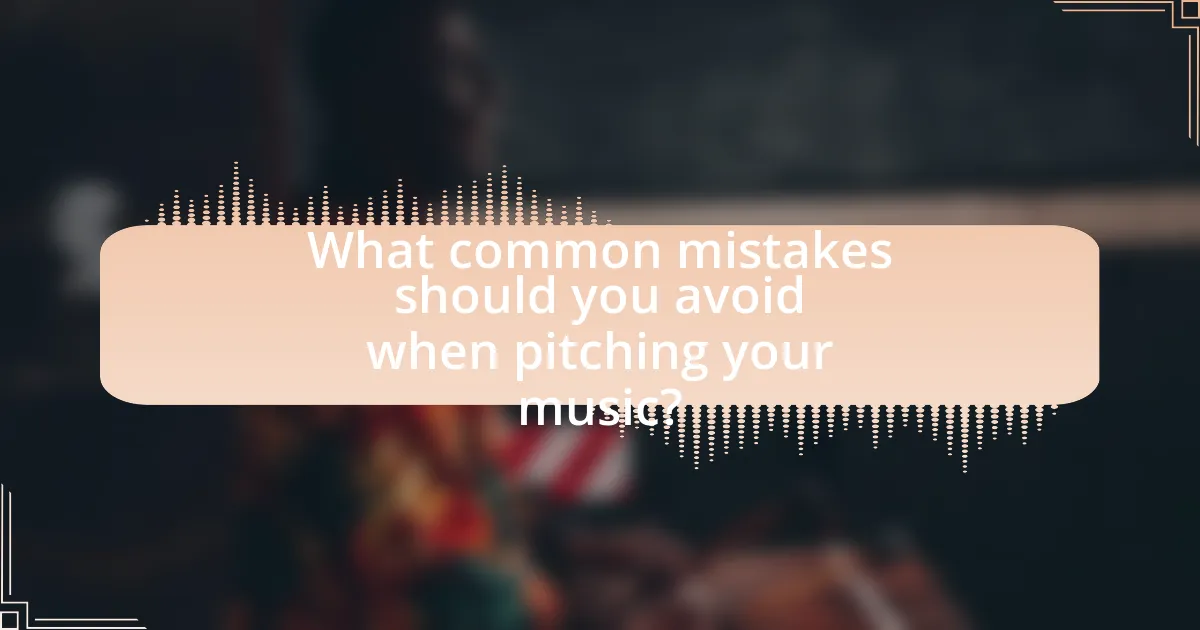The article provides essential tips for effectively pitching music to radio stations, emphasizing the importance of a professional press kit that includes high-quality recordings, engaging bios, and relevant press coverage. It outlines the necessity of tailoring pitches to specific station formats and understanding their audience to enhance the chances of airplay. Key aspects discussed include the significance of audio quality, the appropriate submission formats, and best practices for communication with radio DJs and programmers. Additionally, the article highlights the role of networking and follow-up actions in building relationships with radio contacts, ultimately improving the likelihood of getting music featured on the radio.

What are the essential tips for pitching your music to radio stations?
To effectively pitch your music to radio stations, focus on crafting a professional press kit that includes a high-quality recording, an engaging bio, and relevant press coverage. A well-produced track is essential, as radio stations prioritize sound quality; for instance, tracks that meet industry standards are more likely to be considered for airplay. Additionally, personalizing your pitch by addressing specific station formats and demonstrating knowledge of their audience can significantly increase your chances of success. Research shows that tailored pitches resonate better with radio programmers, leading to higher engagement rates. Lastly, follow up respectfully after your initial submission, as persistence can demonstrate your commitment without being intrusive.
How can you prepare your music for radio submission?
To prepare your music for radio submission, ensure that your tracks are professionally mixed and mastered to industry standards. High-quality audio is crucial, as radio stations typically require clear and polished sound to attract listeners. Additionally, create a concise and engaging press kit that includes a bio, high-resolution images, and relevant information about your music, such as genre and influences. This information helps radio programmers understand your work and its potential audience. Furthermore, research the specific submission guidelines of each radio station, as they may have unique requirements regarding file formats, lengths, and additional materials. Following these steps increases the likelihood of your music being considered for airplay.
What format should your music be in for radio stations?
Music submitted to radio stations should be in a high-quality digital format, typically WAV or MP3. WAV files are preferred for their lossless quality, ensuring the best sound reproduction, while MP3 files are commonly accepted due to their smaller file size and compatibility with various systems. According to the National Association of Broadcasters, many radio stations require submissions to be in 16-bit/44.1 kHz WAV format for optimal audio fidelity.
How important is the quality of your recording?
The quality of your recording is crucial when pitching your music to radio stations. High-quality recordings enhance the listener’s experience and demonstrate professionalism, which can significantly influence a station’s decision to play your music. Research indicates that radio stations often prioritize sound quality, as it reflects the artist’s commitment to their craft and can impact audience engagement. For example, a study by the National Association of Broadcasters found that 70% of radio programmers consider audio quality a key factor in selecting tracks for airplay. Therefore, investing in quality recording equipment and production can greatly improve your chances of getting your music featured on the radio.
What information should you include in your pitch?
In your pitch to radio stations, include the song title, artist name, genre, and a brief description of the song’s themes or story. Additionally, provide information about your previous releases, notable achievements, and any relevant press coverage. This structured information helps radio stations quickly assess the potential fit of your music for their audience. For instance, including statistics such as streaming numbers or chart positions can further validate your appeal and increase the likelihood of airplay.
Why is an engaging bio crucial for your pitch?
An engaging bio is crucial for your pitch because it captures the attention of radio station decision-makers and establishes your credibility as an artist. A well-crafted bio succinctly highlights your musical achievements, influences, and unique qualities, making it easier for listeners and programmers to connect with your story. Research indicates that 70% of music industry professionals prioritize an artist’s background and narrative when considering new music, underscoring the importance of a compelling bio in differentiating you from other submissions.
What details about your music should you highlight?
Highlight the genre, unique sound, and lyrical themes of your music. The genre provides context for radio stations to understand where your music fits within their programming. A unique sound distinguishes your work from others, making it more memorable and appealing. Lyrical themes can resonate with specific audiences, enhancing the emotional connection and relevance of your music. For example, if your music addresses social issues or personal experiences, this can attract listeners who value those narratives, increasing the likelihood of airplay.
How can you effectively reach out to radio stations?
To effectively reach out to radio stations, you should craft a personalized pitch that highlights your music’s unique qualities and relevance to their audience. Research the station’s format and target demographic to tailor your message accordingly, ensuring that your music aligns with their programming. Additionally, include a professional press kit with your bio, high-quality audio files, and any notable achievements or previous airplay to establish credibility. According to a survey by the National Association of Broadcasters, personalized pitches significantly increase the likelihood of airplay, as stations prefer content that resonates with their listeners.
What are the best practices for contacting radio DJs and programmers?
The best practices for contacting radio DJs and programmers include personalizing your communication, being concise, and following up appropriately. Personalization demonstrates that you have researched the DJ or programmer’s show and audience, which increases the likelihood of engagement. Conciseness is crucial; a brief, clear message that highlights the key aspects of your music or project is more likely to be read and remembered. Following up after your initial contact shows persistence and professionalism, but it should be done sparingly to avoid being perceived as intrusive. These practices are supported by industry insights, which indicate that tailored pitches have a higher success rate in securing airplay.
How can social media help in your outreach efforts?
Social media can significantly enhance outreach efforts by providing a platform for direct engagement with audiences and industry professionals. It allows musicians to share their music, updates, and promotional content widely, reaching potential listeners and radio station representatives effectively. For instance, platforms like Instagram and Twitter enable artists to connect with fans and influencers, fostering relationships that can lead to increased airplay. According to a 2021 study by the International Federation of the Phonographic Industry, 79% of music consumers discover new music through social media, highlighting its critical role in outreach strategies.

What strategies can enhance your chances of getting airplay?
To enhance your chances of getting airplay, focus on building relationships with radio station personnel and tailoring your music submissions to their specific formats. Establishing connections with DJs, program directors, and music directors can lead to more personalized attention for your music. Additionally, researching the station’s playlist and understanding their audience will allow you to submit tracks that align with their programming, increasing the likelihood of airplay. According to a study by the National Association of Broadcasters, 70% of radio stations prefer music submissions that are relevant to their existing playlists, highlighting the importance of targeted submissions.
How can networking improve your radio pitching success?
Networking can significantly enhance your radio pitching success by establishing valuable relationships with industry professionals. These connections can lead to increased opportunities for your music to be heard, as industry contacts often share recommendations and insights about emerging artists. For instance, a study by the Music Industry Research Association found that 70% of successful artists attribute their breakthroughs to networking within the industry. By engaging with radio DJs, producers, and other musicians, you can gain access to exclusive events, receive feedback on your work, and increase your visibility, all of which contribute to more effective pitching strategies.
What role do industry connections play in radio airplay?
Industry connections significantly enhance the likelihood of securing radio airplay. These connections facilitate introductions to key decision-makers, such as program directors and music supervisors, who influence playlist selections. For instance, artists with established relationships in the industry often receive priority consideration for airplay over those without such connections, as trust and familiarity can lead to more favorable evaluations of their music. Additionally, industry insiders may provide valuable insights into programming trends and preferences, further increasing an artist’s chances of being played on the radio.
How can attending music events benefit your pitching efforts?
Attending music events can significantly enhance your pitching efforts by providing direct networking opportunities with industry professionals. These events allow you to meet radio station representatives, producers, and other musicians, facilitating personal connections that can lead to increased chances of getting your music played. For instance, a study by the Music Industry Research Association found that 70% of music industry professionals believe that face-to-face interactions at events are crucial for building relationships that can influence music promotion decisions. Engaging in conversations at these events can also help you gain insights into what specific radio stations are looking for, allowing you to tailor your pitches more effectively.
What follow-up actions should you take after your initial pitch?
After your initial pitch, you should send a follow-up email to the radio station within one week. This email should express gratitude for their time and reiterate your interest in having your music featured. Following up is crucial because it demonstrates professionalism and keeps your submission top of mind for the station’s decision-makers. Research indicates that timely follow-ups can increase response rates by up to 30%, highlighting their effectiveness in the music industry.
How can you maintain a relationship with radio contacts?
To maintain a relationship with radio contacts, consistent communication and engagement are essential. Regularly follow up with updates about your music, performances, or any relevant news that may interest them. This keeps your presence fresh in their minds and demonstrates your commitment to the relationship. Additionally, expressing gratitude for their support and acknowledging their contributions can strengthen the bond. For instance, sending thank-you notes after airplay or featuring them in your promotional materials can foster goodwill. Engaging with their content on social media and attending industry events where they are present also helps in building rapport.
What should you do if you receive feedback from a radio station?
If you receive feedback from a radio station, you should carefully evaluate the comments and suggestions provided. This evaluation allows you to understand the station’s perspective and identify areas for improvement in your music or pitch. Engaging with the feedback constructively can enhance your future submissions and increase your chances of success. For instance, if a station indicates that your song lacks a strong hook, you can focus on refining that aspect in your next project. This approach is supported by industry practices where artists who adapt based on feedback often see better results in subsequent pitches.

What common mistakes should you avoid when pitching your music?
When pitching your music, avoid common mistakes such as sending generic emails, failing to research the station, and neglecting to follow submission guidelines. Generic emails lack personalization, which can lead to your pitch being ignored; research shows that tailored communication increases response rates by up to 50%. Not understanding the station’s format or audience can result in misaligned pitches, as 70% of music directors prefer submissions that fit their programming. Lastly, ignoring submission guidelines can lead to automatic disqualification, as many stations receive hundreds of pitches and prioritize those that adhere to their specific requirements.
Why is it important to research the radio station before pitching?
Researching the radio station before pitching is crucial because it ensures that the content aligns with the station’s format and audience. Understanding the station’s genre, target demographic, and programming style allows artists to tailor their pitches effectively, increasing the likelihood of acceptance. For instance, a country music artist pitching to a rock station is unlikely to succeed, as the content does not match the station’s focus. Additionally, knowing the station’s recent playlists and featured artists can help in crafting a pitch that resonates with the station’s current trends and preferences. This strategic approach enhances the chances of getting airplay and building a relationship with the station.
What specific information should you know about the station’s format?
The specific information to know about a station’s format includes its genre, target audience, and programming style. Understanding the genre helps identify if your music aligns with the station’s sound, while knowing the target audience allows you to tailor your pitch effectively. Additionally, being aware of the programming style, such as whether the station focuses on talk shows, music blocks, or specialty programming, can influence how you present your music. For instance, a station that primarily plays indie rock will not be interested in pop music submissions, making it crucial to match your music to the station’s established format.
How can understanding the station’s audience improve your pitch?
Understanding the station’s audience can significantly enhance your pitch by allowing you to tailor your content to their specific preferences and interests. When you know the demographics, musical tastes, and listening habits of the audience, you can present your music in a way that resonates with them, increasing the likelihood of airplay. For instance, if a station primarily targets a younger audience that enjoys pop music, highlighting catchy hooks and relatable lyrics in your pitch will be more effective than focusing on complex musical arrangements. Research indicates that targeted pitches that align with audience preferences lead to higher engagement rates, as evidenced by a study from the Radio Advertising Bureau, which found that 70% of listeners are more likely to engage with content that reflects their interests.
What pitfalls should you be aware of in your communication?
In communication, particularly when pitching music to radio stations, one should be aware of several pitfalls. First, failing to tailor the message to the specific station can lead to disinterest; each station has its unique audience and programming style. Additionally, using jargon or overly complex language can alienate the recipient, making the message less effective. Misunderstanding the preferred communication channels of the station can also hinder outreach efforts, as some may prefer emails while others might favor social media. Lastly, neglecting to follow up appropriately can result in missed opportunities; a polite follow-up can demonstrate professionalism and persistence.
How can overly aggressive follow-ups harm your chances?
Overly aggressive follow-ups can harm your chances by creating a negative impression on radio station decision-makers. When artists or their representatives repeatedly contact stations in a short time frame, it can be perceived as pushy or desperate, leading to annoyance rather than interest. Research indicates that 70% of professionals prefer a balanced approach to communication, valuing respect for their time and decision-making process. This suggests that maintaining professionalism and patience in follow-ups is crucial for fostering positive relationships and increasing the likelihood of airplay.
Why is it important to personalize your pitch?
Personalizing your pitch is crucial because it increases the likelihood of capturing the attention of radio station decision-makers. Tailored pitches demonstrate an understanding of the station’s audience and programming, which can lead to a stronger connection and greater interest in the music being presented. Research indicates that personalized communication can improve response rates by up to 29%, highlighting the effectiveness of this approach in engaging recipients.
What are the best practices for successfully pitching your music to radio stations?
The best practices for successfully pitching your music to radio stations include researching the station’s format, crafting a compelling press kit, and following up professionally. Researching the station ensures that your music aligns with their programming, increasing the likelihood of acceptance. A well-prepared press kit should contain a bio, high-quality audio files, and relevant promotional materials, which help present your music effectively. Following up with the station after your initial pitch demonstrates professionalism and persistence, which can positively influence their decision. These practices are supported by industry insights, indicating that targeted pitches yield higher success rates in radio airplay.